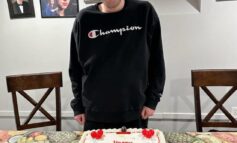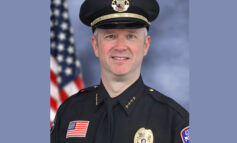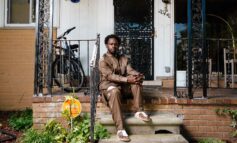DEARBORN — It isn’t easy for survivors of domestic violence to go public with their stories, especially when they’re part of such a close-knit community. In an effort to help other women, two local Arab Americans courageously discussed their own experiences with overcoming abusive relationships during the event, Voices over Violence, which addressed domestic violence in families, relationships and the community. The program was held Saturday, Oct. 19 at the Ford Community and Performing Arts Center here.
“I wanted to tell my story to help other women and let them know they’re not alone,” said Bianca, an Arab American, who chose not to use her real name and experienced domestic violence for nearly 10 years in her previous marriage.
“A woman came up to me saying, ‘I’ve been in a relationship for 30-years and I don’t know how to get out. I don’t have family, I’m on disability, and I can’t get out,’ I said, yes you can. She said, ‘I don’t have family,’ I told her, I’m your family,” Bianca said.
Bianca went to school with her previous husband, but still never noticed any signs that he was abusive until after they were married, which is when he became violent.
She ended up finding herself in an abusive marriage, while she was in law school and raising a child. Bianca eventually decided it wasn’t healthy to stay in the relationship and that it was time to map out a plan to leave.
Bianca wants other women in the community, who are currently in the same place that she once was, to know they don’t have to take on domestic violence by themselves and that plenty of resources are available to help them.
The event offered free services to domestic violence victims and included powerful performances by singers, poets and speakers. Victims of domestic who attended had access to free legal aid counseling, participated in seminars on teen dating violence and met with specialists to discuss strategies on how to successfully leave and overcome an abusive relationship.
“There are still a lot of women who are scared to come out, scared to seek help, and feel that they are alone. What we tell those women is that we are here, when they’re ready. There is help. There are resources,” said Mona Makki, supervisor and therapist at the Arab Community Center for Economic and Social Services (ACCESS).
ACCESS has a domestic violence program that offers free and confidential services, such as monthly support groups, counseling, psychiatric services, case management, legal services and food vouchers, among other resources.
In addition to being physical, domestic violence comes in other forms, including sexual, verbal, emotional, economic or spiritual abuse.

|
| Nadia Hamade. |
Nadia Hamade, a graduate of Wayne State University Law School and an attorney with her own private practice in Livonia, Attorney Source, PLC, also shared her own story about overcoming domestic violence.
Hamade says it was her children who pushed her to get out of the violent relationship.
“I think my children give me the most strength. I am the mother of three daughters, and I feel that if I don’t stand up for myself, then I’m going to witness them going through the same thing. This is me, standing up for my daughters and trying to make a difference, so that they can have successful relationships and have a better chance than me. I think that if you set the example for them that it is acceptable, you’re teaching them the wrong message. The message that you want to teach them is that it is not right. I would rather give my life, and give everything that I have, than to witness my daughters go through what I went through, and I know that the only way I could protect them from going through the same thing is to set a better example for them and to walk away,” Hamade said.
She says getting out of a violent relationship in the beginning is a real struggle and what scared her most about being a single parent was worrying how to make ends meet, while raising her children.

“There are resources, and it is important to reach out to those resources. You want to be quiet and not let anybody know, and it is embarrassing. How could you be such a strong person, like me, but deal with such things and be so weak. It is really embarrassing, and it is a real struggle. In the end, you become who you were meant to be, and you regain the strength that you lost in the relationship, because it is taken away from you and stolen from you,” Hamade said.
Makki expressed concern about the effects domestic violence has on children.
Just by being witness to domestic violence, children can become victims themselves.
For many women, realizing the effects that domestic violence has on their children, is a wake-up call.
Makki says children who witness domestic violence may experience trouble with the legal system, problems at school, relationship issues and could develop mental health problems, such as depression and anxiety.
“Children are a product of their environment, and when they live in an abusive environment, it shows them that it is okay to be violent; it is okay to be disrespected; it is not okay to speak out. That’s what you will see when they mature and get older,” said Siham Awada Jaafar, president and CEO of 3D Consulting and Communications and the former chairwoman of the ACCESS domestic violence coalition.
She says it is important for children who witness domestic violence to let their parents know how it is effecting them and, more importantly, to stand by the parent and give them the courage and strength to be able to get out of the situation.
She says women can be role models to their children, by getting out of abusive relationships and showing them that they will not stand for violence.
U.S. Attorney for the Eastern District of Michigan Barbara McQuade also spoke at the event that was emceed by FOX 2’s Robin Murdoch and attended by U.S. Congressman John Conyers. McQuade said that, under U.S. Attorney Eric Holder’s administration, a project was started, called Defending Childhood. One of the troubling statistics found through it was that 25 percent of American children are exposed to domestic violence.
“Children who are exposed to domestic violence are likely to have learning problems that make it difficult for them to succeed in school. They are likely to have health issues; things like anxiety, depression and learning issues, and they’re more likely to turn to drugs and alcohol. They are more likely to have post traumatic stress disorders, and that’s the kind of thing you get in combat. One of the most troubling things we’ve seen is they, themselves, became a part of this cycle of violence. Children exposed to violence become violent offenders, unless someone helps them,” McQuade said.
McQuade said domestic violence is not a family matter, but rather a crime, and that the victims are never at fault for it.
“They are not in this by themselves. There are so many resources; so many opportunities to get help. There are so many people you can call; places that you can turn to actually get help with a PPO, with making a plan, or an exit strategy to leave an abusive relationship,” Jaafer said.
WHERE TO GET HELP
Organizations providing resources
to survivors of domestic violence:
Wayne County Prosecutor’s Office:
Domestic Violence Unit:
313.224.5857
First Step:
734.416.1111 (Plymouth)
734.722.1772 (Wayne)
Haven 24 hr. crisis and support
(Includes shelter):
248.334.1274
Turning Point Administration:
586.463.4430
24 hour crisis line: 586.463.6990
Domestic Violence Project/
SAFE House:
734.973.0242
Crisis Hotline, 24 hours: 734.995.5444
ACCESS:
313.216.2202
Arab American and Chaldean Council:
248.559.1990
The National Domestic Violence
Hotline:
800.799.SAFE
National Coalition Against
Domestic Violence:
202.745.1211





Leave a Reply